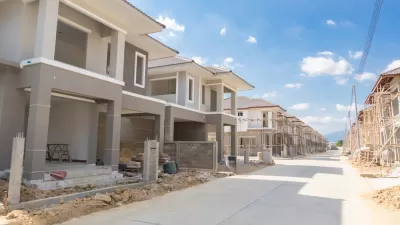It’s difficult to know who owns property because corporate landlords and investors tend to structure their business as limited liability companies, or LLCs.

You should be able to know who your neighbors are. This may seem like a relatively obvious statement, but people and communities across the country are finding it harder to do this, in large part due to the increasing role of financialization in housing. Financialization refers to the increasing importance of finance in everyday life; in housing, it’s partially driven by financial firms that are increasingly intertwined with the ownership and operation of residential housing as landlords, lenders, and investors. Scholars who study financialization have found that large corporate investors can shape rental pricing increases, defer maintenance, decrease neighborhood stability, and increase vacancy and eviction rates. However, they do it at a distance, in an abstract and not transparent way.
[RELATED: What is the Financialization of Housing?]
That is to say, when a large corporate investor is your landlord, or an investment vehicle forecloses on a home in your neighborhood, it’s often hard to know who or what owns the property due to the use of limited liability companies (LLCs). LLCs are a type of business structure that enable the owner to enjoy the limited liability benefits of a corporate structure while still receiving the tax benefits of a partnership. While the exact legal definition of LLCs varies slightly by state, this core definition is present nationwide. This makes LLCs an excellent option for business ventures that are owned by single individuals or small groups, as is often the case for investor-owned real estate. However, this business form, when extended to the ownership of real property, makes it hard to know who actually owns housing.
The same qualities that make LLCs attractive to smaller-scale owners make them an attractive vehicle for large corporate investors looking to buy hundreds of properties without attracting attention. When a private equity firm or large corporate landlord uses residential housing as collateral, often the formal owner of the property is an anonymous LLC, one per property. It’s difficult to accurately quantify and trace the scope of this phenomenon because there is no transparency. As these financial practices accelerate, the number of homes with untraceable or difficult-to-trace ownership proliferates. Regardless of investor size or type, LLC ownership of real property can create problems at the local level for tenants, neighbors, and municipalities.
The percentage of rental units owned by non-individual investors (in addition to LLCs, these also include corporate forms like limited partnerships and real estate investment trusts) rose from 17.3 percent in 2001 to 24.5 percent in 2015. In most states, LLCs are required to list a registered agent who can receive...
FULL STORY: When Landlords Hide Behind LLCs

Alabama: Trump Terminates Settlements for Black Communities Harmed By Raw Sewage
Trump deemed the landmark civil rights agreement “illegal DEI and environmental justice policy.”

Study: Maui’s Plan to Convert Vacation Rentals to Long-Term Housing Could Cause Nearly $1 Billion Economic Loss
The plan would reduce visitor accommodation by 25% resulting in 1,900 jobs lost.

Planetizen Federal Action Tracker
A weekly monitor of how Trump’s orders and actions are impacting planners and planning in America.

Waymo Gets Permission to Map SF’s Market Street
If allowed to operate on the traffic-restricted street, Waymo’s autonomous taxis would have a leg up over ride-hailing competitors — and counter the city’s efforts to grow bike and pedestrian on the thoroughfare.

Parklet Symposium Highlights the Success of Shared Spaces
Parklets got a boost during the Covid-19 pandemic, when the concept was translated to outdoor dining programs that offered restaurants a lifeline during the shutdown.

Federal Homelessness Agency Places Entire Staff on Leave
The U.S. Interagency Council on Homelessness is the only federal agency dedicated to preventing and ending homelessness.
Urban Design for Planners 1: Software Tools
This six-course series explores essential urban design concepts using open source software and equips planners with the tools they need to participate fully in the urban design process.
Planning for Universal Design
Learn the tools for implementing Universal Design in planning regulations.
Caltrans
Smith Gee Studio
Institute for Housing and Urban Development Studies (IHS)
City of Grandview
Harvard GSD Executive Education
Toledo-Lucas County Plan Commissions
Salt Lake City
NYU Wagner Graduate School of Public Service





























